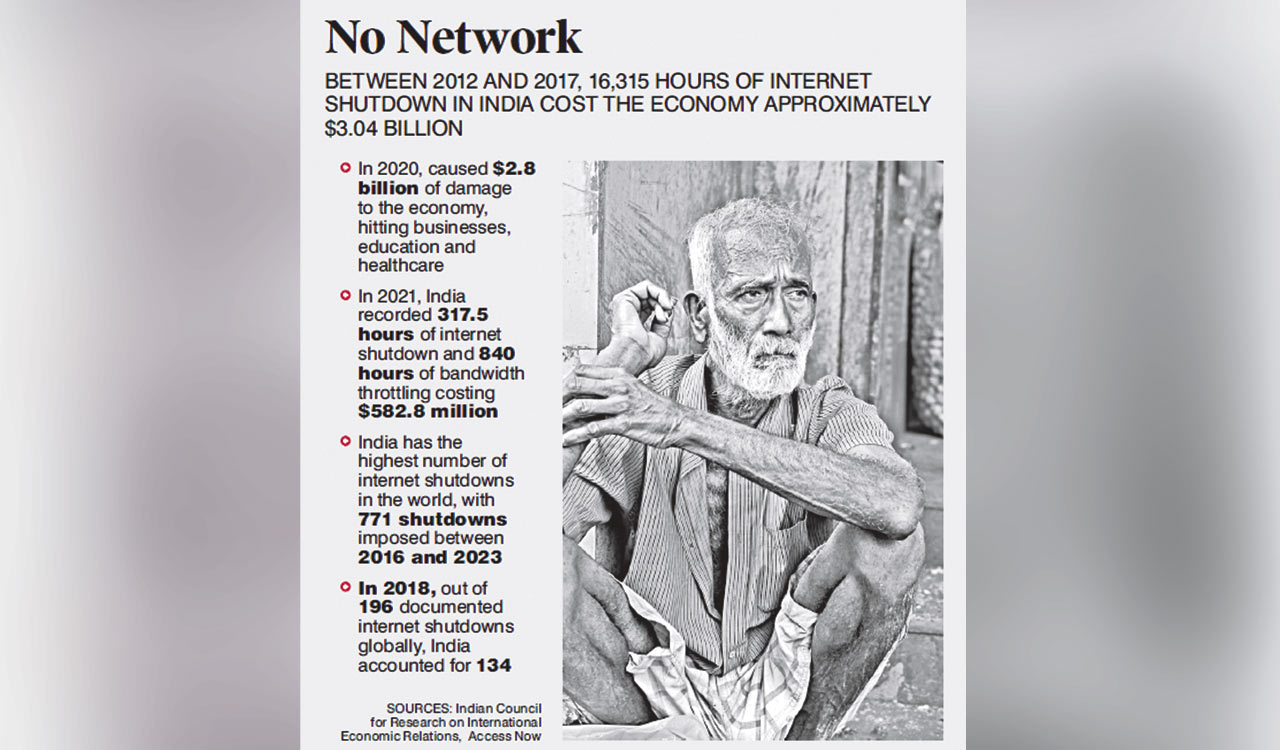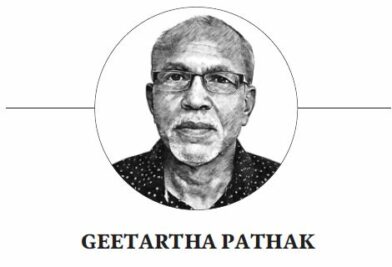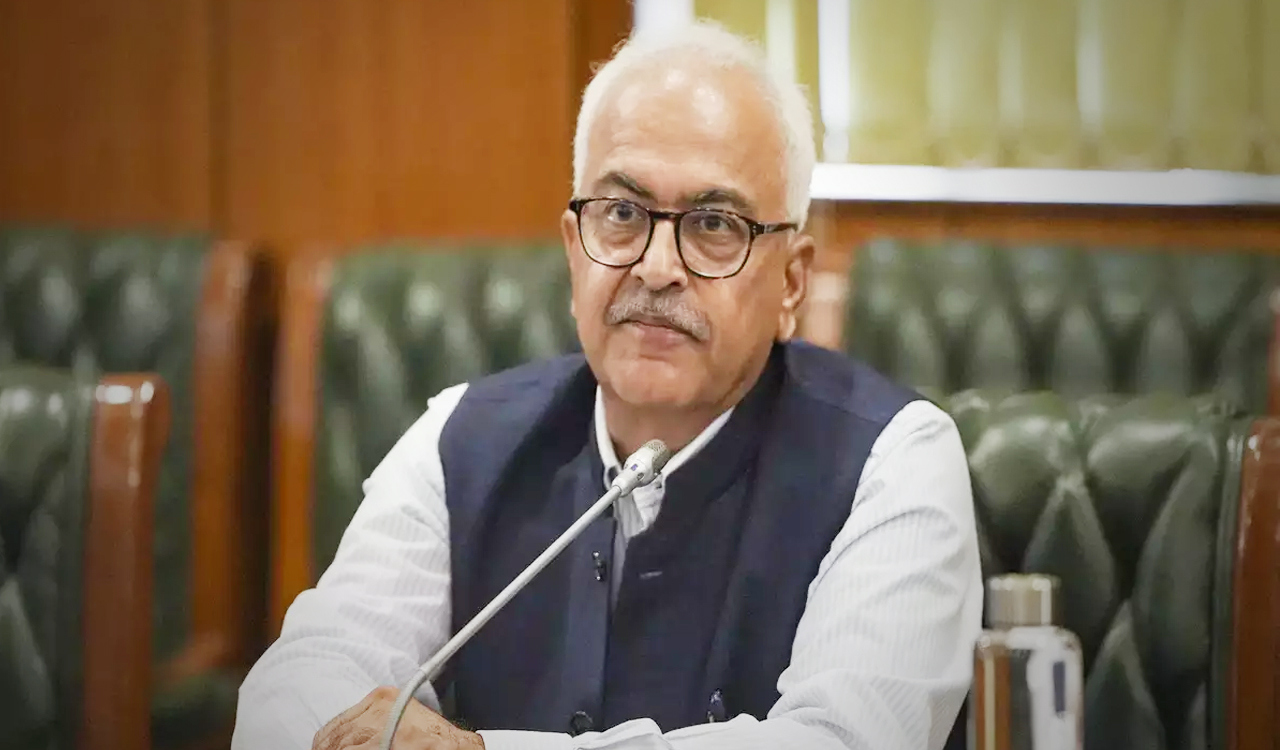Opinion: Internet ban hurts marginalised
If the government wants to be seen as a credible global leader in digital efforts, it should immediately stop imposing such shutdowns

By Geetartha Pathak
India imposes more internet shutdowns than many countries of the world, and this is extremely detrimental to civil liberties as well as the economy of the country. However, most shutdowns are not reviewed by courts because in several cases the aggrieved parties are unable to reach courts in time, and consequently the internet shutdown orders expire.
Jammu & Kashmir witnessed the longest internet shutdown of over 550 days since the evening of 4 August 2019, when Article 370 was abrogated. The State was bifurcated into the Union Territories of Jammu & Kashmir and Ladakh. A preventive shutdown was imposed in the State which is yet to be lifted entirely. In Manipur, a statewide shutdown was enforced after violence broke out following communal clashes. The internet shutdown in Manipur is the second longest in the country as seen so far and it is also the longest lockdown in 2023.
Manipur has been under internet shutdown for more than 250 days. While broadband services were generally allowed, more than 96% of the population did not have access to the internet as less than 4% of the population in the country has access to broadband services. The government in its attempt to justify mass internet shutdown, expressed that the shutdowns are put in place “to thwart the design and activities of anti-national and anti-social elements and to maintain peace and communal harmony.”
Weapon of Control
Governments, armies and many other authorities are increasingly resorting to internet shutdowns as a weapon of control during national crises, protests, school and recruitment examinations, communal riots, elections and the latest — national disasters. While these are all marked as prominent triggers, now conflicts have emerged for the first time as the leading driver of internet shutdown.
Freedom House’s ‘Freedom on the Net 2023’ report gives India a Freedom on the Net status of “Partly Free” with a rating of 50 (0-100, higher is better), from 41 in 2017. Its Obstacles to Access was rated 13 (0-25 scale), Limits on Content was 20 (0-32 scale) and Violations of User Rights was 17 (0-40 scale).
Internet shutdowns have often helped the government throttle dissent, critical voices and mass public gatherings. After growing discontentment among the public for a prolong internet shutdown, the High Court of Manipur intervened and through its order dated July 7, 2023, directed the State government to restore the internet in a limited fashion — through broadband connections while keeping certain safeguards in place. The order further directed the State government to conduct a survey and whitelist select new mobile numbers to restore communication services. On December 3, Manipur came out of complete internet darkness, putting an end to the longest internet shutdown to take place in 2023.
However, the Manipur government again suspended internet and mobile data services in five districts — Imphal East, Imphal West, Thoubal, Bishnupur and Kakching, for five days from September 10 to September 25. The development came amid rising tensions and ongoing student protests in the State.
Shutdown during Exams
The Assam government issued orders directing the suspension of internet services in several districts on August 21 and 28, 2022, and September 15 and 28, 2024, to prevent cheating during governmental recruitment examinations.
Suspension of internet services to stop cheating in examinations is not mandated by the existing laws. Section 5(2) of the Telegraph Act, 1885, permits an internet ban only on the occurrence of a public emergency or in the interest of public safety. The Supreme Court in the Anuradha Bhasin case had held that ‘public emergency’ is such a situation which involves ‘widespread risk of injury to public’ and the expression ‘public safety’ means a state of danger or risk for the people at large. Cheating in exams does not fall under the meaning of these explanations. On the other hand, the Calcutta High Court in Ashlesh Biradar v State of West Bengal stayed the internet suspension order issued by the Government of West Bengal to prevent cheating in examinations as it did not comply with Section 5(2) of the Telegraph Act, 1885.
Moreover, the Parliamentary Standing Committee on Communication and Information Technology in its 26th report titled ‘Suspension of Telecom Services/Internet and its Impact’ observed that cheating in exams does not amount to large-scale public safety concerns or public emergencies and that “suspension rules have been grossly misused leading to huge economic loss and causing untold suffering to the public, as well as severe reputational damage to the country.”
In 2019, the Kerala High Court also ruled that the right to internet access is a fundamental right that is part of the right to privacy and education under Article 21 of the Constitution. The court ruled that the restrictions violated student’s right to education and privacy.
The #NoExamShutdown is a new campaign dedicated to combating this rights-violating practice and advocating for free and open internet access for all. The initiators of the campaign Access Now, the Internet Society (ISOC) and SMEX vow to continue building efforts for the #NoExamShutdown campaign to ensure that people and communities have uninterrupted access to online resources essential for their daily activities and livelihood.
Human Rights
Even though these shutdowns blatantly violate human rights enshrined in national, regional and international frameworks, governments deliberately imposed shutdowns to advance their political agenda. Authorities continued to give insufficient or ill-defined reasons for imposing shutdowns, such as national security concerns, public safety or to prevent the spread of misinformation and hate speech. In majority of cases, the government took no responsibility and offered no explanation.
The government of India under the leadership of Prime Minister Narendra Modi has repeatedly professed a commitment to Digital India. Ironically, the central government proudly talks about a digital world and a trillion-dollar economy even as it relentlessly bans the internet impacting millions of vulnerable people of the country. If the government wishes to be credible in its efforts to be recognised as a global digitisation leader, it should immediately stop imposing internet shutdowns in the world’s largest democracy.


(The author is a senior journalist from Assam)
Related News
-
Former Home Secretary Ajay Kumar Bhalla appointed Manipur Governor, Kerala Governor shifted to Bihar
-
19-year-old Sam Konstas all set to make Test debut for Australia at MCG
-
Boxing Day Test: Rohit opens up on his batting position, Kohli’s form
-
Representation of women in media is one-dimensional: Filmmaker Payal Kapadia
-
Telangana techie loses Rs 4.15 lakh to online gold trading fraud
4 mins ago -
Hyderabad: Couple working as house help at doctor’s residence held for theft
19 mins ago -
Hyderabad auto driver foils attempt to kidnap young woman, five held
1 hour ago -
Haiti gang attack on journalists covering hospital reopening leaves 2 dead, several wounded
2 hours ago -
21 dead as Mozambique erupts in violence after election court ruling
3 hours ago -
Cartoon Today on December 25, 2024
10 hours ago -
Sandhya Theatre stampede case: Allu Arjun questioned for 3 hours by Chikkadpallly police
11 hours ago -
Telangana: TRSMA pitches for 15% school fee hike and Right to Fee Collection Act
11 hours ago




